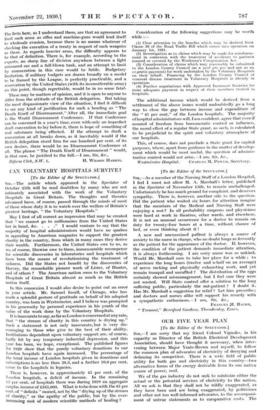CAN VOLUNTARY HOSPITALS SURVIVE?
[To the Editor of the SPECTATOR.] SIR,—The article which appeared in the Spectator of October 25th will be read doubtless by many who are not intimately associated with the work of the Voluntary Hospitals in Great Britain. The thoughts and theories advanced have, of course, passed through the minds of most of those whose duty it is to watch over the welfare of Britain's greatest heritage, " the Voluntary Hospitals."
May I first of all correct an impression that may be created that " we cannot go to millionaires from the United States hat in hand, &c. . . ." I would venture to say that the majority of hospital administrators would have no qualms in appealing to American magnates to support the greatest charity in the country, from which in many cases they derive their wealth. Furthermore, the United States owe to us, as we, of course, likewise owe to them, immeasurable recompense for scientific discoveries in laboratories and hospitals which have been the means of revolutionizing the treatment of sickness. Did the States not benefit by the discoveries of Harvey, the remarkable pioneer work of Lister, of Hunter, and of others ? The American nation owes to the Voluntary Hospitals of Great Britain almost as much as the British nation itself.
In this connexion I would also desire to point out an error in your article. Mr. Samuel Insull, of Chicago, who has made a splendid gesture of gratitude on behalf of his adopted country, was born in Westminster, and I believe was prompted in his generosity by personal experience in his youth of the value of the work done by the Voluntary Hospitals.
It is inaccurate to say, as far as London is concerned at any rate, that " the stream of charity in this country is drying up." Such a statement is not only inaccurate, but is very dis- couraging to those who give to the best of their ability. Institutions dependent upon voluntary support are, of course, badly hit by any temporary industrial depression, and this year has been, we hope, exceptional. The published figures for 1929 show that the purely voluntary donations to our London hospitals have again increased. The percentage of the total income of London hospitals given in donations and subscriptions is no less than 38.3, and a further 10.6 per cent. Caine to the hospitals in legacies.
There is, however, in approximately 45 per cent. of the London hospitals, a deficit of income. In the remaining 55 per cent. of hospitals there was during 1929 an aggregate surplus income of £165,000. What is to be done with the 45 per cent. of " deficits " caused, not by the " drying up of the stream of charity," or the apathy of the public, but by the ever- increasing cost of modern scientific methods of healing ?
Consideration of the following suggestions may be worth while :—
(1) Close attention to the benefits which may be derived from Clause 36 of the Road Traffic Bill which conies into operation on January 1st, 1931.
(2) Investigation as to claims which may be made for reimburse- ment in connexion with the treatment of accidents to patients insured or covered by the Workmen, Compensation Act.
(3) Consideration of claims which may reasonably be submitted to the London County Council (as a quid pro quo and not as on c.r-graria payment) for work undertaken by the Voluntary Hospitals on their behalf. Financing by the London County Council of venereal disease treatment in Voluntary Hospitals is already in operation.
(4) Further negotiations with Approved Insurance Societies for more adequate payment in respect of their members treated in hospitals.
The additional income which would be derived from a settlement of the above issues would undoubtedly go a long way to close the gap between income and expenditure of the " 45 per cent." of the London hospitals. The majority of hospital administrators will, lam confident, agree that even if assured of freedom from bureaucratic control or influence, the moral effect of a regular State grant, as such, is calculated to be prejudicial to the spirit and voluntary atmosphere of our hospitals.
This, of course, does not preclude a State grant for capital purposes, where, apart from guidance in the matter of develop- ment which would be most useful, the question of adminis- trative control would not arise.--I am, Sir, &c.,
Westminster hospital. CHARLES M. Powen, Secretary.


















































































 Previous page
Previous page